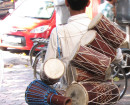 From the markets of Hyderabad, India to the chants of Tibetan monks, the meaning of ‘live’ music has gone up a mighty notch. This year, on the occasion of World Music Day, we celebrate the spirit of looking at the universe itself as music.
From the markets of Hyderabad, India to the chants of Tibetan monks, the meaning of ‘live’ music has gone up a mighty notch. This year, on the occasion of World Music Day, we celebrate the spirit of looking at the universe itself as music.
Equipped with their machines and requirements, producers are increasingly stepping out get the real world experiences into their music-scapes. And it’s to tackle the simple conflict of organic vs. synthetic sounds.
Artiste Shivacult, whose music derives its peculiarity with the local sounds from his city streets, of vendors selling their goods in markets and even rare instruments, points out, “Some kinds of music (like Arabic and Indian classical) call for slides between notes that are not possible through the keyboard pitch-bend feature. This calls for sampling the glides played through instruments and use them in the production that adds to the authenticity of the music theory.”
He goes on to add, “Also, I personally tend to use samples of rare instruments such the Gu Zheng, Erhu, Kim and Bozouki that have very rich tonality and are very region specific. Ofcourse, most sampled sounds are rare instruments or maybe some really expensive instruments like the hangdrum. The use of the samples depends completely on the subject of the art you are making.”
So why the extra effort? He simplifies it: “Fidelity. Live acoustic instruments + Analogue mics = Clear sound as opposed to sampled instruments + digital sound interface = low, cheap quality sound.”
This trend doesn’t only mean that the samples are being collected by the producers themselves. They are also relying on “some really experienced ears in the music industry”. Shivacult names, “James and Dan from soniccouture.com who make sampled instruments”
Meanwhile, Yotam Agam (Sony), notes, “The “Genre “ Based music has become wide open and there are many crossovers , virtual collaboration and a very fast and large accessibility to different high quality royalty free music.”
While he names Nucleya as among the those who is mastering sampling and its usage in music, with hi tempo, humur and fun. “The way he uses samples in his own music production is fresh and unique while Sulk Station is more down tempo and dramatic with melancholic sounds using samples.”
– Monkey Correspondent